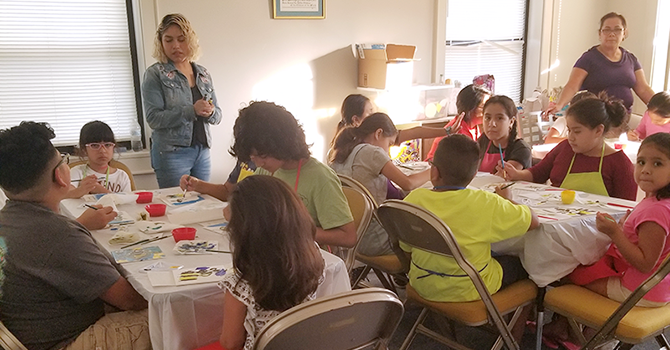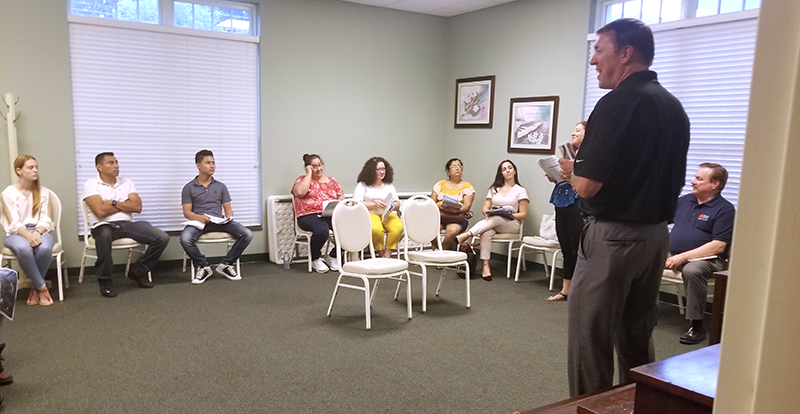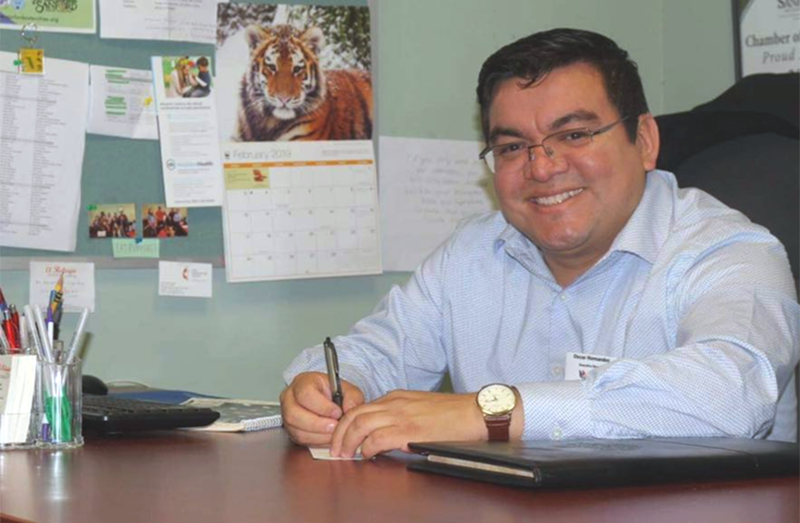August 4, 2020
El Refugio offers learning and community to immigrants

Childcare providers teach arts and crafts to children during El Refugio's Summer Fest in 2019. The 2020 version has moved online. Photos courtesy of El Refugio
A church-based resource center — “The Refuge” in English — works with local institutions to help immigrants build new lives in rural North Carolina. During the pandemic, that work has become even more vital.
Sandra Ruíz moved to the mainland U.S. in 2017 from Puerto Rico, just one week before Hurricane Maria devastated the island.
A longtime friend convinced her to move to Sanford, North Carolina, with her youngest son, who was then 15.
She spent the first weeks traveling. But when she settled in, she realized that not knowing English was going to be a big hurdle in finding a job, despite her 15 years of experience as a second grade teacher.
“Although in Puerto Rico we’re taught English since kindergarten, regrettably, we didn’t pay attention, because we thought of it as one more class to take with no purpose. We didn’t know how much of a necessity it really is,” she said.
Ruíz searched online for free English classes and found a local organization called El Refugio offering just that. The next month, she took a placement exam and showed up to the English as a second language class with a notebook. Her resolve, however, soon gave way to doubt.

“I felt a terrible fear that I had never felt before,” Ruíz said. “I felt fear because I didn’t know the language and I didn’t know what my life would look like in the future. I felt fear because I didn’t know if I had made the right decision to move here.”
But those fears were assuaged by El Refugio’s staff and English instructors, to whom Ruíz remains thankful. Their words of encouragement and the camaraderie with the other students in the class made her feel as though she had a personal support group during this big change in her life.
She’s not alone. More than six years after El Refugio opened its doors, it has enrolled more than 2,000 students in its language, U.S. citizenship and computer classes; provided child care to more than 500 children; engaged 200 volunteers each year with cross-cultural experiences; and engaged more than 7,000 local residents in cultural events. English-speaking residents have the opportunity to take Spanish lessons as well.
Under the leadership of El Refugio’s dynamic and well-connected executive director, Oscar Hernandez, the organization has positioned itself as an integral resource for immigrants. It has developed relationships with local institutions, such as the school system, the city government and the community college, where Hernandez works.
This story illustrates the benefits of trusting institutional partnerships that share a common mission of serving the local community. What factors are key to their successful collaboration?
El Refugio builds vital bridges, helping these institutions better serve the community’s immigrants and helping the immigrants gain access to the services they need. Currently, it is continuing to offer direct services related to needs during the pandemic, while shifting its usual activities online.
One of its most remarkable successes: 100% of the 35 El Refugio students who have taken the naturalization exam have become U.S. citizens.
In Ruíz’s first 2 1/2 years in the U.S., she has taken multiple ESL courses, joined El Refugio’s board of directors, obtained a full-time job with the local school district and, most recently, purchased a car.
She continues to take ESL classes because she says she still has a lot to learn. Her next goal is to start a master’s degree program in social work and purchase a house.
“Personally, El Refugio is the best thing I could’ve found here,” Ruíz said. “It’s been a support and strength. They helped me with all my questions when I was new to the county — where do I look, where do I ask, where do I go. It changed my professional life, my personal life and my family life.”
How El Refugio started
El Refugio, which translates to “The Refuge” in English, is a resource center based at Jonesboro United Methodist Church that provides direct services to Hispanic immigrants in the area. It’s located in the town of Sanford in Lee County, about 45 minutes southwest of the state’s capital. About 26% of the local population is Hispanic or Latino.
In 2013, a local Hispanic ministry combined with Jonesboro United Methodist Church. The pastors wanted to serve not only the spiritual needs of Sanford’s Hispanic residents but also the basic needs of these people living in a new place.

The church worked with a consultant who helped them write a grant application to The Duke Endowment; that $150,000 grant launched the organization in 2014 with the vision of “educational, leadership and cultural programs that unite Spanish-speaking and English-speaking families in a ministry of inclusion, mutual service and support.”
El Refugio has accomplished all of this with three part-time staff, an involved executive board of directors, the support of Jonesboro UMC and a strong partnership with the local community college, Hernandez said.
The Rev. Andi Woodhouse, the pastor of Jonesboro UMC, cites Hebrews 13:2, Matthew 22:39, Mark 12:31 and Luke 10:27 as the reasons the church started El Refugio.
What is most challenging when you think about loving your neighbors?
“This teaching is as radical and challenging today as it was over 2,000 years ago,” Woodhouse said.
“Jesus spent his time on earth with those who were marginalized and outcast. El Refugio continues to faithfully live into its mission of building bridges while promoting interaction with newcomers and longtime residents of Sanford and Lee County.”

‘You’re going to learn’
Makenna Bowers logs in to a Blackboard video call to start the class for her adult students from the deck in her backyard. An umbrella shades her face from the evening sun. It’s a mid-July Wednesday evening in rural North Carolina.
The writing assignment for the class is projected on the full screen, while Bowers’ face appears on the bottom right corner of the call.
Write about what you did over the weekend.
Make sure to have at least 5 sentences.
Reflect — How was your weekend? How did you feel?
Normally, this Level 1 ESL class takes place in person, but the class has functioned in a virtual format since the onset of the COVID-19 pandemic. Through a partnership with Central Carolina Community College, El Refugio offers free classes on English as a second language and Spanish as a second language.
Luz Felipe’s name appears on Bowers’ screen.
“Oh, hi, Luz,” Bowers says.
A few seconds later, she asks, “José, estas aquí?”
José Rámos’ name appears.
“Sometimes the microphones don’t work,” Bowers says. And sometimes the internet connection isn’t strong.
But finally, both Felipe and Rámos establish a connection. There are sometimes as many as five to eight students in the class, but attendance has dropped as some students are traveling or work schedules have changed. Others are taking care of sick family members.
Both Felipe and Rámos are residents of Sanford, Spanish speakers who recently immigrated to North Carolina. They’re taking part in El Refugio’s most popular program; it’s one that, as Ruíz discovered, can be vitally important in finding work.
Luz Felipe moved from the Dominican Republic to Florida about four years ago. She married her husband in Florida, and a year later, they moved to Sanford to live near his parents.
“Ever since I moved to the U.S., I wanted to learn English,” Felipe said.
She began to take ESL classes in Miami, but five months into her first pregnancy, the logistics became too hard to manage. Later, the couple moved to Sanford, where they had their second son, Christian.
Felipe heard of the ESL classes offered by El Refugio through a family member in the early spring.
“I’m very persistent when I want to learn something. I would call El Refugio early in the mornings. Then I finally met Mr. Oscar, and he opened the doors for me,” Felipe said.
“The classes had already started, but he gave me the opportunity. He said, ‘It’s not a problem; you’re going to learn.’ From the very beginning, El Refugio has been wonderful to me.”
Felipe began taking the language classes in person in February. Her husband, who works the second shift, would watch the kids in the mornings while she went to class.
About a month later, the classes transitioned to online as the coronavirus began to spread. As is happening in states across the U.S., Latinos in North Carolina are being hit disproportionately hard by the virus.
Felipe now attends classes by computer in the mornings and evenings from Tuesday to Thursday. Bowers, her instructor, calls her every other day so she can practice her speaking skills. Between the classes and the phone calls, Felipe dedicates about six hours a week to her English studies.
“She has so much patience,” Felipe said of Bowers. “She establishes the conversation and asks about my day — what I cooked, how the kids are — so I can improve my fluency with her. With her I don’t feel embarrassed. She corrects me, but she does it so sweetly, so you’re not discouraged when you say it wrong. Every day, I feel so grateful for her, because she has helped us so much.”
A ‘lifelong contract’
Oscar Hernandez, 39, is well respected in the community — it seems that somehow everybody has his cellphone number.
He moved to Sanford from El Salvador with his parents and siblings when he was 18 years old, in 1999. His visa had come through a year before he could finish high school in El Salvador.

At Central Carolina Community College, he completed all the levels of ESL, obtained his GED and later earned a business administration degree. Now he works full time for the community college as the coordinator of ESL career pathways.
In that position, he has one-on-one meetings with people who are interested in learning English and shows them what career opportunities may be available once they’ve learned the language. He also helps recruit instructors and manages the materials that the ESL classes use.
Hernandez understands the public school system as well. Before working at the community college, he worked as an interpreter and translator for the local school district, helping improve the academic performance of ESL students.
Who are the Oscar Hernandezes in your community? How might your church recognize, appreciate and build on the gifts and service of community servants like Hernandez?
This background has proved vital in his role at El Refugio, providing both connections and insight into the community needs. During his time in the schools, for example, he observed that the students who struggled the most were those who were newest to the school system and the country.
Although Hernandez works part time for El Refugio as the executive director, he calls it a “lifelong contract.”
“I don’t consider this a job. Never. One of the things I’ve learned in rural North Carolina is that you do this type of work because it’s a calling,” he said.
What work is calling to you today?
Hernandez, who was raised Catholic, said he’s comfortable leading the UMC-based organization.
“El Refugio’s mission and the Methodist Church’s mission is to serve the community; that fits into what I believe. Sometimes people tell me I breathe El Refugio,” Hernandez said.
Reflecting on his work with the organization, he often switches to Spanglish — and makes light of how much the organization has expanded during his leadership.
He jokes about “Oscar’s big ideas.”
The U.S. citizenship and computer classes are among “Oscar’s big ideas” that eventually developed into programs. Under Hernandez’s leadership, the organization established a partnership with Apex Immigration Services — a low-cost, ministry-based legal clinic — that has helped more than 50 families in Sanford file applications for Deferred Action for Childhood Arrivals and temporary protected status just last year.
Deb Taylor, an El Refugio board member and the organization’s treasurer, said Hernandez’s role in the community college has been pivotal to El Refugio’s growth.
“The community college has been an amazing partner for us; Oscar being in several positions in town is a real advantage to us,” she said. “Having Oscar with feet in both of those worlds is just instrumental in our success. He is face to face with the college people and decision makers, and also with the students and the community.”
The community college and El Refugio share the cost of paying the ESL instructors. Additionally, Jonesboro UMC provides the space to hold the classes and sometimes donates event space.
Beyond direct services, El Refugio puts on three big events each year to bring the community together, two of which center on culture and food.

Another core event is Summer Fest, a two-week session of classes (such as art, cooking, and photography), legal clinics, and more at no cost to participants. It has moved online this summer, with offerings ranging from how to make hot chicken to TikTok dancing.
Lee County was one of eight counties in North Carolina experiencing particularly high rates of positive coronavirus cases in June. In early May, a worker at the Pilgrim’s Pride meatpacking plant in Sanford died from complications of COVID-19. Although only 9% of North Carolina’s population is Latino, 44% of confirmed COVID cases are in the Latino community, in cases where the ethnicity is known.
The death from COVID-19 of an employee of the meatpacking plant reminds us of the kind of work being done by many of the newest Americans around the country. How is this reality linked with our worship at the Lord’s Table?
El Refugio has taken a hands-on role during the pandemic. In just one week, the staff handled more than 80 calls and text messages from people requesting help and information, people who needed to feel reassured by connecting with someone rather than reading information.
Hernandez and the staff frequently translate messages about the coronavirus published by local government agencies into Spanish and have delivered food to the homes of people who have tested positive for the virus.
Besides its obvious impact on El Refugio’s programming, the pandemic has also complicated an important goal for the organization. More than 50% of El Refugio’s budget comes from The Duke Endowment grant.
Taylor, the board treasurer, said the organization had already begun pivoting to local fundraising this year with a fundraising committee. But the pandemic complicated those efforts, she said, because the organization didn’t want to pull away donations from businesses and individuals who could offer assistance to local residents during this time.
Taylor expects El Refugio to be fine financially for now, as program costs are less since everything has moved online, but she does worry about the lost opportunities to reach financial independence before the grant runs out. El Refugio has grown so much that it’s considering whether it should register as a separate nonprofit.
“It is high time to tap into a stronger network of local and regional company, civic, and individual supporters, and it seems the staff and volunteers are in place to move this forward,” she said.
Its clients also are moving forward, as Angel Mills, Lee County’s ESL director, can attest. Mills serves on El Refugio’s board of directors and stresses that the relationship between El Refugio and the school district is a reciprocal one.
Mills has seen firsthand how the ESL classes prepare individuals to work in a professional setting: she hired Sandra Ruíz, the ESL student from Puerto Rico, to be the school district’s migrant recruiter for the federally funded Migrant Education Program.
“She’s smart. She understands parents. She knows people,” Mills said of Ruíz. “She has been an amazing ambassador for both Lee County Schools and El Refugio for adult education and parent involvement in children’s lives. … She is a great example of that.”
Questions to consider
Questions to consider
- This story illustrates the benefits of trusting institutional partnerships that share a common mission of serving the local community. What factors are key to their successful collaboration?
- The Rev. Andi Woodhouse says that Scripture’s call to love our neighbor as ourselves is radical and challenging today. What is most challenging when you think about loving your neighbors?
- Who are the Oscar Hernandezes in your community? How might your church recognize, appreciate and build on the gifts and service of community servants like Hernandez?
- Hernandez comments that his (second) job as executive director of El Refugio is a “lifelong contract” and that he does this kind of work “because it’s a calling.” What work is calling to you today?
- The article’s mention of the death from COVID-19 of an employee of the meatpacking plant reminds us of the kind of work being done by many of the newest Americans around the country. How is this reality linked with our worship at the Lord’s Table?



Share